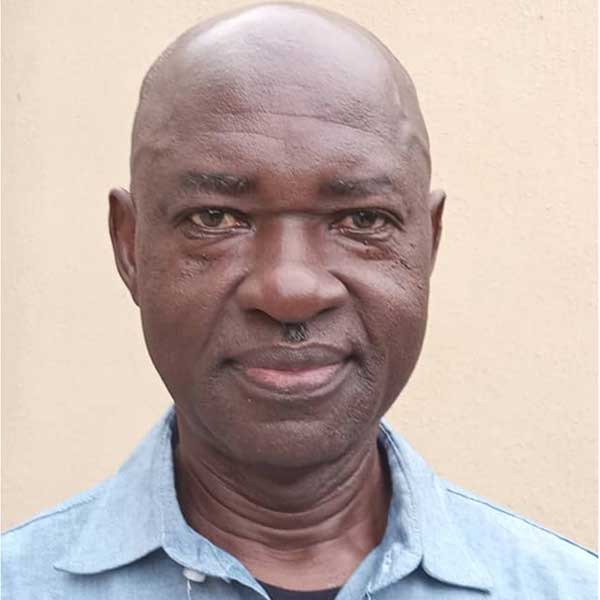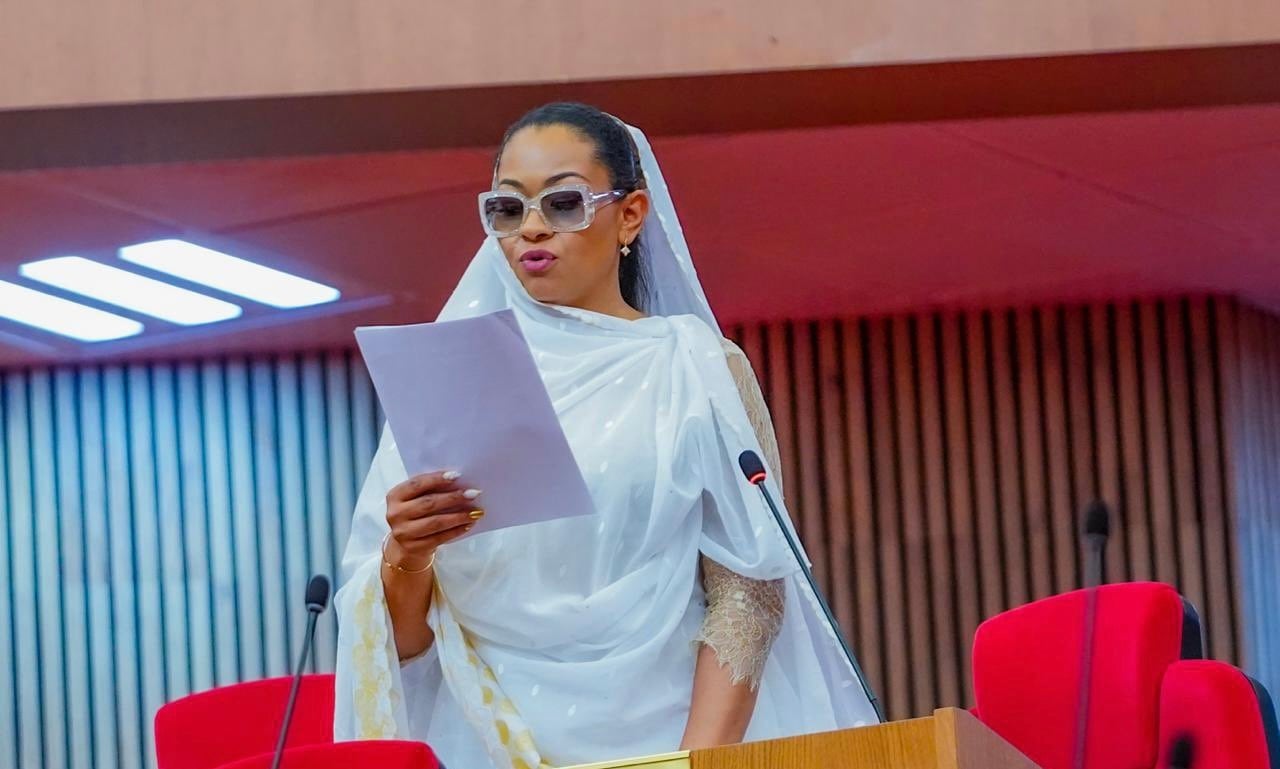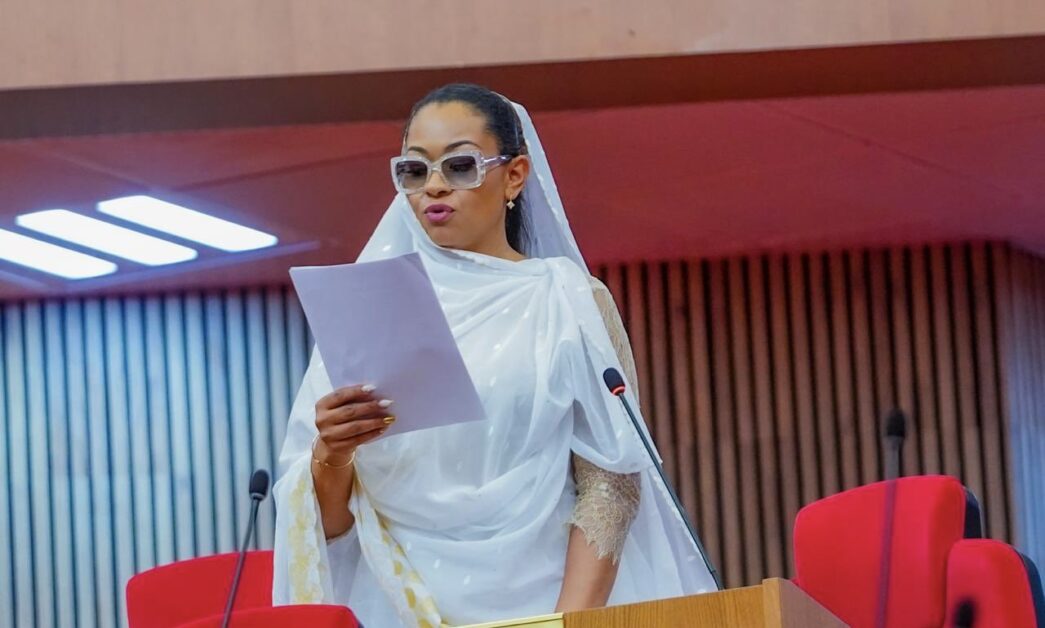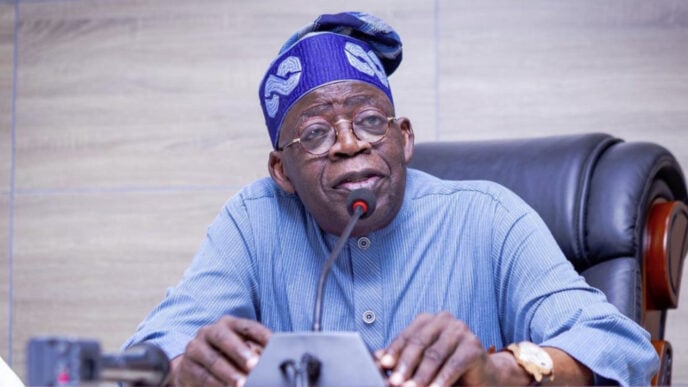Natasha Akpoti-Uduaghan
In just few weeks, the senator representing Kogi central senatorial zone, Senator Natasha Akpoti-Uduaghan, has assumed a somewhat mixed image in the minds of people. That comes from a cocktail of characters either expressed herself or imposed on her by external forces. Her most obvious physical attribute is her ravishing beauty, a feature that’s clearly not her fault and for which she owes no one apologies. The other day, a former minister of works, Senator Adeseye Ogunlewe, declared on television that Senator Natasha’s looks would naturally be a problem to her, as every average man wouldn’t be satisfied with only one look at her. I refer those who doubt the elder to the psychoanalysis of Sigmund Freud. Libido’s capacity to captivate, engage and even enslave is well established.
Whether asset or liability, Natasha’s beauty has been mined to produce negativity for whatever purpose. In a chamber that is supposed to be hallowed, this worthy representative of a political, electoral third of her state was once told that her dressing was transparent, good for a nightclub. The regrets from the President of the Senate, Senator Godswill Akpabio, were in response to various protestations against alleged sexism. Social media too swelled up with stories of the senator having a number of children for as many men.
The trigger of the current spotlight on Akpoti-Uduaghan, a seemingly innocuous seating arrangement in the red chamber, signifies how an unlikely chain of events can change the course of history. Not every great thing happens with a bang. Even without the prior notice that is required by senate rules in such circumstances, I still don’t see why the lady refused to shift her ground, especially with the concerted pleas from her colleagues. Could that be hubris? Or yet another human frailty on display?
In her quiet moments, she should ponder over why her fellow senators appear to have distanced themselves from her travails, at least publicly. Not even anyone of her gender has stood with her in the sexual harassment allegations she has levelled against Senator Akpabio. That may or may not be a product of betrayal or timidity. No matter the level of rot that exists within any democratic institution, it’s wise to seek and sustain allegiance and understanding within its fold. For, no matter how sterling one’s profile is, democracy is, in the end, a tyranny of the majority. It’s a no brainer to conclude that more than any other factor, Natasha’s inability to achieve adequate bonding with the lawmakers was responsible for the speed with which they arrived at the suspension handed to her on March 6. Akpabio’s own drama with the ‘ayes’ and ‘nays’ that day which nailed her notwithstanding.
Advertisement
What can’t be denied at this point, however, is that, contrary to the viewpoints which tend to confine her to a seductive, sex symbol, this Natasha truly embodies much more. I’m not even talking of the stamina to withstand the bouquet of court cases she has either initiated or those raised against her. Neither am I referring to her controversial media appearances and the one at the Inter Parliament Union (IPU) in New York where she escalated her grievances to national and global audiences. Those were certainly not moves made by the fainthearted. They can actually be interpreted as a continuation of an intriguing, rising persona.
The feminine, vulnerable aura that’s her trademark can only be misinterpreted to any rival’s detriment. In our largely chauvinistic and patriarchal environment, only the humble and modest can really appreciate and possibly guard against her emerging strengths. A former Governor of Kogi State and self-styled white lion, Alhaji Yahaya Bello, had a feel of Natasha’s grit, first when she contested for governor on the platform of a less-fancied Social Democratic Party (SDP) and, later, in her race for senate on the ticket of the People’s Democratic Party (PDP).
The fights which resulted in her senate membership today depict the arrival on the scene of a true potential amazon. Apart from having a brain that works optimally, Akpoti-Uduaghan, no doubt, deserves to be taken seriously on other fronts, particularly the ties she has nurtured with her constituents. The bravery she has exhibited over and over didn’t start with the people of Kogi central but is now developing into a formidable machine because of the relationship that’s built on mutual trust, integrity and assured benefits. These noble qualities can’t be taken for granted in many parts of Nigeria, unfortunately.
Advertisement
To the frustrating nightmare of her traducers, the senator is not working alone. The recall processes orchestrated against her the other day fell flat because the promoters couldn’t prove that her electorate wanted her out in the cold. I believe it was the strong popular opposition to the dubious scheme that halted that plan, not any so-called due diligence by the Independent National Electoral Commission (INEC). Same for the jubilant, heroic reception she received on her surprise visit home by helicopter during the last Sallah. Outsmarting the adversarial state government which had outlawed that event ought to be a proof that stopping an enigmatic figure like her takes more than subterfuge and intimidation.
The present power configuration in the state further accentuates the Natasha phenomenon. Bello and his successor, Alhaji Usman Ododo, though from the same Kogi central, haven’t been able to match Natasha’s towering altitude. This situation speaks of the senator’s prioritisation of her constituents’ needs and the tangible outcomes. It also announces the growing political sophistication of the zone. The message is simple: in a multidimensionally poor country like Nigeria, being genuinely and visibly involved in the socio-economic emancipation of the masses can be a huge capital. Even without executive powers, the lady of courage is seen to address poverty frontally. These efforts can’t be brushed aside in a predominantly civil service state whose workers were constantly dehumanised with a strange payment model under Bello called ‘percentage’, a pretext for giving them eight, 11, 15, 22 thousand naira and other ridiculous salaries monthly.
In the end, stewardship is all about the people, a truth that is lost on many Nigerian politicians. A recent article titled, “The Four Big Questions Shaping Democracy in Africa” and written by Frances Z. Brown, Vice President for Studies of Carnegie Endowment, attempts to identify key obstacles to representative governance on the African continent. It includes four posers. Brown’s explanation of the first query – can newly elected governments deliver for their people? – relates directly to Natasha’s magic wand: As she puts it, “These recently installed governments now face a huge test of tangibly delivering for their citizens – and democracy supporters should watch closely. The new governments all face economic headwinds that troubled their predecessors, while also having to confront their own particular circumstances…
“Despite the strong overall support for democracy as a system of government across the continent, only 37 percent of Africans say they are satisfied with the way that democracy actually works in their own countries.… Accordingly, demonstrating that voters’ decisions can lead to peaceful transfers of power, and ultimately to material improvements in citizens’ lives, will have important demonstration effects for democracy across the continent. Regardless of whether the newly installed governments feature long-familiar faces (as in Ghana and Mauritius) or a fresh generation of leadership (as in Botswana and Senegal), citizens will be watching closely.”
Advertisement
Even with Natasha’s shortcomings, most of the good people of Kogi central have found a selfless, purposeful leader and her appeal is spreading to other parts of the state and beyond. And her moment is already gathering some momentum. Nigerians may not always be this docile, defeated and resigned. They may one day begin to demand accountability and respect from their political leaders.
Ekpe, PhD, is a member of THISDAY editorial board.
Views expressed by contributors are strictly personal and not of TheCable.











